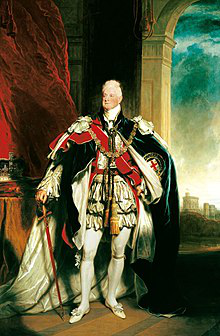

King of the United Kingdom
21 August 1765 Buckingham House, London
20 June 1837(1837-06-20) (71) Windsor Castle, Berkshire, United Kingdom
NamesWilliam Henry
King of the United Kingdom of Great Britain and Ireland and of Hanover from 1830 to 1837 For other people titled William IV, see William IV (disambiguation). King of the United Kingdom William IVPortrait by Martin Archer Shee, 1833King of the United Kingdom (more...) Reign26 June 1830 – 20 June 1837 Coronation8 September 1831PredecessorGeorge IVSuccessorVictoriaKing of HanoverReign26 June 1830 – 20 June 1837 PredecessorGeorge IVSuccessorErnest AugustusBorn(1765-08-21 ) 21 August 1765 Buckingham House, LondonDied20 June 1837(1837-06-20) (aged 71) Windsor Castle, Berkshire, United KingdomBurial8 July 1837 St George's Chapel, WindsorSpouseAdelaide of Saxe-Meiningen (m. 1818 )Issue more... George FitzClarence, Earl of Munster Henry FitzClarence Sophia Sidney, Baroness De L'Isle and Dudley Lady Mary Fox Lord Frederick FitzClarence Elizabeth Hay, Countess of Erroll Lord Adolphus FitzClarence Lady Augusta Gordon Lord Augustus FitzClarence Amelia Cary, Viscountess Falkland Princess Charlotte of Clarence Princess Elizabeth of Clarence HouseHanoverFatherGeorge III of the United KingdomMotherCharlotte of Mecklenburg-StrelitzSignatureMilitary careerAllegiance United Kingdom Service/branch Royal Navy (active service)Years of service1779–1790 (active service)RankRear-Admiral (active service)Commands held HMS Valiant HMS Andromeda HMS Pegasus Battles/warsBattle of Cape St Vincent William IV (William Henry; 21 August 1765 – 20 June 1837) was King of the United Kingdom of Great Britain and Ireland and King of Hanover from 26 June 1830 until his death in 1837. The third son of George III, William succeeded his elder brother George IV, becoming the last king and penultimate monarch of Britain's House of Hanover. William served in the Royal Navy in his youth, spending time in North America and the Caribbean, and was later nicknamed the "Sailor King". In 1789, he was created Duke of Clarence and St Andrews. In 1827, he was appointed as Britain's first Lord High Admiral since 1709. As his two older brothers died without leaving legitimate issue, he inherited the throne when he was 64 years old. His reign saw several reforms: the poor law was updated, child labour restricted, slavery abolished in nearly all of the British Empire, and the British electoral system refashioned by the Reform Act 1832. Although William did not engage in politics as much as his brother or his father, he was the last British monarch to appoint a prime minister contrary to the will of Parliament. He granted his German kingdom a short-lived liberal constitution. At the time of his death, William had no surviving legitimate children, but he was survived by eight of the ten illegitimate children he had by the actress Dorothea Jordan, with whom he cohabited for twenty years. Late in life, he married and apparently remained faithful to Princess Adelaide of Saxe-Meiningen. William was succeeded by his niece Victoria in the United Kingdom and his brother Ernest Augustus in Hanover.

We use cookies
We use cookies and other tracking technologies to improve your browsing experience on our website, to show you personalized content and targeted ads, to analyze our website traffic, and to understand where our visitors are coming from. Privacy Policy.